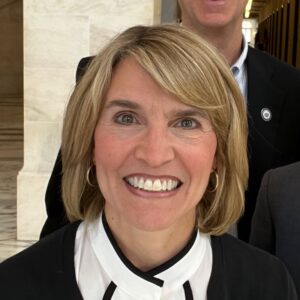Trust, Vision, Change: Mastering Higher Ed Change Management
Explore higher ed change management strategies from Dr. John Chopka that drive trust, collaboration, and vision through institutional transitions.
Branding
Colleges and universities with massive brand equity get there only over long periods of time and through only one way—intentional branding.
That’s because branding in higher education is more than just a logo or a tagline—it’s a long-term strategy that reflects who you are as an institution.
A logo might look good on a billboard or a brochure, but it’s an identifier that can only go so far. It doesn’t tell the full story of who an institution is or what it stands for.
Branding that focuses solely on visuals like logos can become inconsistent or disjointed, especially across various touchpoints—admissions materials, social media, websites, and in-person experiences.
The danger here is that they may not be able to see what makes you unique.
More importantly, a logo-centric view of branding often overlooks the emotional connection that can be cultivated with prospective students, families, and alumni.
Branding should invite people into a story—a mission that resonates deeply with their own values and aspirations.
Without that invitation, institutions risk becoming just another name in an already crowded higher ed marketplace.
For many schools, this leads to a failure to establish the brand loyalty and affinity needed for long-term growth.
And by the way, you don’t have to be a large school with a massive budget to do it!
 In this episode of The Higher Ed Marketer podcast, Janice Supplee, Vice President for Marketing and Communications at Cedarville University, joins us on the show.
In this episode of The Higher Ed Marketer podcast, Janice Supplee, Vice President for Marketing and Communications at Cedarville University, joins us on the show.
Over the course of our conversation, Janice shares her insights into how Cedarville has built an intentional and impactful brand that resonates deeply with students, faculty, and alumni.
Cedarville’s story truly exemplifies this concept of intentional branding.
At the heart of Cedarville’s messaging is a unique metaphor called “1000 Days.”
This inspirational metaphor represents the idea that the college experience is more than just academics. It’s an intentional journey of personal, spiritual, and professional growth.
Janice recounts how Cedarville’s “1000 Days” branding concept started organically.
During a State of the University address, Cedarville’s president presented the idea of a student’s approximately 1000 days on campus.
This powerful metaphor captured the essence of the Cedarville experience: intentional growth academically, spiritually, and socially.
“What are you going to do with your 1000 days?” became more than just a slogan—it turned into a key part of Cedarville’s identity.
Janice’s team immediately recognized the potential of this message, and they ran with it.
Janice explains that this concept resonates especially well with parents, who want to ensure their children are receiving more than just an education.
Cedarville’s focus on developing students intentionally in a short span of time has made the “1000 Days” campaign an effective tool in differentiating their institution from others in the crowded higher ed landscape.
At its core, the “1000 Days” metaphor is a commitment to intentionality, both for students and for the institution itself.
Cedarville’s marketing team aims to ensure that every part of the student journey is meaningful, intentional, and purpose-driven.
For me, this was pleasantly surprising. In my experience, marketing teams tend to be reactive to the needs around them as opposed to intentionally building a long-term brand narrative.
So, how did Cedarville get their marketing team to buy into intentional branding?
It begins with the people that you hire. You want to make sure that you are hiring people that have bought into [your school’s] mission and so you don’t have to reign them back in. “Hey, don’t go that direction! That’s not a good fit for who we are.”
When we’re hiring full time staff or we’re hiring students, I’m looking for [a match between our] culture and a mission-fit as much as I am [a mission-fit for the school].
We can train for skill. But that culture and mission-fit is critically important [and we can’t train for that].
Hiring mission-fit staff leads to branding and messaging strategies that attract mission-fit students.
By starting with hiring, Janice and her executive team are ensuring that every member of her team is aligned with the university’s purpose, which results in more cohesive, mission-driven messaging across all touchpoints.
One of the critical takeaways from the episode is the importance of consistency in branding.
Janice reveals that Cedarville has stuck with the “1000 Days” concept for almost a decade.
Even though marketing teams can get bored of their messaging, Cedarville understands the importance of repetition to build brand recognition.
Consistency is critically important.
When you talk about Cedarville, you’re going to hear academic excellence, biblical faithfulness, vibrant community.
[That message is] going to look and sound different based on our audience, but those three points are going to be there again and again.
Too often, as marketers, we tend to chase the next shiny object.
If we’re honest, we tend to be reactive to what the big school down the street is doing, rather than maintaining our focus on our own distinctives.
This dedication to consistent messaging has allowed Cedarville to create a strong, recognizable brand that remains fresh through creative updates, even as the core message stays the same.
As Cedarville continues to build its brand, Janice emphasizes that a sustainable brand goes beyond flashy campaigns.
It’s about aligning your brand messaging with your mission and being intentional in everything you do.
Cedarville’s intentional branding approach, deeply rooted in their mission, is a model for other institutions seeking to stand out in the crowded higher education landscape.
As Janice says, “Your brand is your reputation.”
For any institution looking to build or refresh its brand, the Cedarville approach offers valuable lessons on the power of intentionality, trust, and alignment.
Listen to our full interview with Janice Supplee to get even more insights into:
The essential marketing book every higher education institution needs! If you are a higher education marketing professional seeking a fail-safe plan to make your institution stand out, “Chasing Mission Fit” is your guide.
 Discover how to:
Discover how to:
So you can empower your institution with audience-focused marketing strategies, and attract mission-fit students who will flourish in your unique academic environment.
Ready to transform your institution’s marketing approach?
Order now!
Featured image via cedarville.edu
Subscribe to The Higher Ed Marketer podcast today!